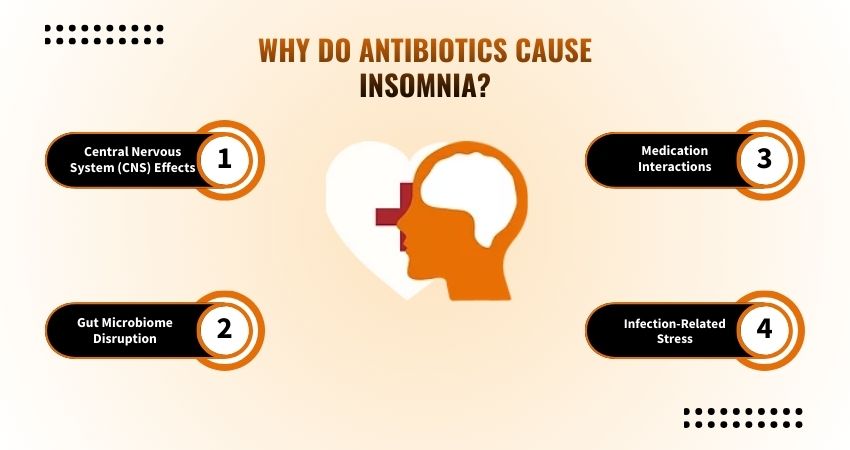Yes, some antibiotics can potentially cause insomnia as a side effect, although it is not very common. Certain classes of antibiotics, such as fluoroquinolones (e.g., ciprofloxacin, levofloxacin, moxifloxacin), are more likely to trigger sleep disturbances, including insomnia, restlessness, and anxiety.
Why Do Antibiotics Cause Insomnia?

- Central Nervous System (CNS) Effects: Antibiotics, especially fluoroquinolones, can cross the blood-brain barrier and may affect neurotransmitters, leading to restlessness or insomnia.
- Gut Microbiome Disruption: Antibiotics can disrupt the gut microbiota, affecting the production of sleep-regulating neurotransmitters like serotonin and melatonin.
- Medication Interactions: Combining antibiotics with other medications, such as steroids or caffeine-containing drugs, may increase the risk of sleep disturbances.
- Infection-Related Stress: The underlying infection itself can cause discomfort, pain, or anxiety, leading to poor sleep quality.
How to Manage Insomnia While Taking Antibiotics
- Consult Your Healthcare Provider: If insomnia persists or worsens, ask your doctor about adjusting the dosage or switching to a different antibiotic.
- Take Antibiotics Early in the Day: If possible, take your antibiotic earlier to minimize its impact on sleep.
- Avoid Stimulants: Limit caffeine and nicotine intake, especially in the afternoon and evening.
- Practice Sleep Hygiene: Maintain a consistent sleep schedule, avoid screens before bedtime, and create a calm, dark, and cool sleeping environment.
- Consider Probiotics: Taking probiotics may help restore gut balance and potentially reduce sleep disturbances.
When to Seek Medical Attention
If insomnia becomes severe, or if you experience additional symptoms such as dizziness, anxiety, or hallucinations, contact your healthcare provider immediately. These could indicate a rare but serious adverse reaction to the antibiotic.
Key Takeaway:
Insomnia is usually caused by stress, poor habits, or health issues. With simple lifestyle changes or professional help, better sleep is possible.
FAQs:
Q1: What is the main cause of insomnia?
The main cause of insomnia is stress, followed by poor sleep habits, anxiety, and medical conditions that disrupt sleep.
Q2: Does Bactrim cause insomnia?
Yes, Bactrim can cause insomnia as a side effect in some people, along with restlessness or trouble sleeping.
Q3: Causes of insomnia in females?
Common causes include hormonal changes, stress, anxiety, depression, and health conditions like thyroid disorders.
Q4: Causes of insomnia in males?
Insomnia in males is often linked to stress, lifestyle habits, sleep apnea, and mental health issues like anxiety or depression.
Q5. Does antibiotic have a sleeping effect?
Antibiotics don’t usually cause sleepiness directly, but they can lead to fatigue, drowsiness, or even insomnia. This is often due to the body fighting infection or changes in gut bacteria that affect energy levels.